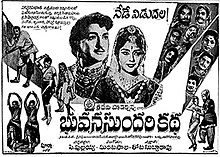Bhuvana Sundari Katha
| Bhuvana Sundari Katha | |
|---|---|
 Theatrical release poster | |
| Directed by | C. Pullaiah |
| Screenplay by | L. N. Acharya |
| Story by | G.V.G |
| Produced by | Thota Subba Rao |
| Starring | N. T. Rama Rao Krishna Kumari |
| Cinematography | C. Nageswara Rao |
| Edited by | B. Gopal Rao |
| Music by | Ghantasala |
Production company | Sridevi Productions |
Release date |
|
Running time | 155 minutes |
| Country | India |
| Language | Telugu |
Bhuvana Sundari Katha (transl. The story of Bhuvana Sundari) is a 1967 Indian Telugu-language swashbuckler film directed by C. Pullaiah. It stars N. T. Rama Rao and Krishna Kumari, with music composed by Ghantasala.[1][2]
Plot
[edit]The film is a tale of two kingdoms, Vichitrapuram & Kanchanapuram, ruled by Chitrasena, & Hiranyavarma, respectively. Chitrasena is an enthusiast of fancy items. In lieu, he occurs half of the kingdom as an accolade. Besides, Hiranyavarma establishes a chair of purity, "Bhuvaneswari Peetam." In which an arraigned garland, non-guilty and culpable, is preyed on by a tiger. Once, Raja guru's son Devadatta attempts to molest Princess Bhuvana Sundari, who is declared preyed. Anyhow, vicious Rajaguru intrigue secures Devadatta, and he quits. En route, he mates with a stranger, Bujjaiah, and they are startled to witness a flying palanquin. Unfortunately, its framer is slaughtered by a demon when the two grab the palanquin and exhibit it to Chitrasena. Here, Prince Chandrasena takes a trail that takes a false trajectory and lands at Bhuvana Sundari's palace, where they crush. The judiciary prosecutes Chandrasena when he acquits and flees to his kingdom in Palanquin with Bhuvana Sundari. At which Devadatta spots Bhuvana Sundari. Accordingly, he abducts her with the palanquin and backs Kanchipuram. However, Bhuvana Sundari absconds and approaches her parents when sycophantic Rajaguru falsifies her as a lunatic. Parallelly, Chandrasena also proceeds, relieving a demon's curse, and is blessed with the boon "Parakaya Pravesha," i.e., leaving one's soul and entering others. At Kanchipuram, a launderer, Tippa shelters him. Since Chandrasena fails to enter the palace, he knows the trick of Tippa swapping the bodies and bailing out Bhuvana Sundari. At that point, hoodwinker Tippa denies taking his body as he is enthralled by Chandrasena's handsome. Hence, Chandrasena in Tippa backs when Rajaguru discerns it and forges Tippa in Chandrasena as a prince before Chitrasena via Devadatta. Now, Chitrasena apprehends Chandrasena in Tippa unbeknownst of fact and announces the nuptial of Chandrasena in Tippa & Bhuvana Sundari. Then Rajaguru wiles in disguise and poses destructive in Bhuvana Sundari's horoscope. Ergo, Chitrasena edicts to drop her into the river in a box. Fortunately, the tribals save her, who put a bear on it. Consequently, the bear strikes when Chandrasena in Tippa slays it, and Rajaguru backstabs him. Thus, he enters the bear, does Rajaguru to death, threatens Tippa in Chandrasena, and recoups his body. At last, Devadatta snatches Bhuvana Sundari in the flying palanquin, and Chandrasena ceases him. Finally, the movie ends with the marriage of Chandrasena & Bhuvana Sundari.
Cast
[edit]- N. T. Rama Rao as Chandra Senudu
- Krishna Kumari as Bhuvana Sundari
- Satyanarayana as Devadatta
- Mikkilineni as Hiranyavarma
- Dhulipala as Rajagaru
- Udaya Kumar as Tippayya
- Mukkamala as Chitrasenudu
- Allu Ramalingaiah as Bujjaiah
- Vanisri as Ellamma
- Chaya Devi as Hiranyavarma's wife
Soundtrack
[edit]Music composed by Ghantasala.[3]
| Song Title | Lyrics | Singers | length |
|---|---|---|---|
| "Desa Desamulu" | Kosaraju | L. R. Eswari, Raghavulu, Ramana | 4:09 |
| "Entha Chilipi" | C. Narayana Reddy | P. Susheela, P. Leela | 4:15 |
| "Naa Sogasu Rammandhi" | C. Narayana Reddy | P. Susheela | 4:16 |
| "Elli Naatho" | Kosaraju | Ghantasala | 2:25 |
| "Evarikainaa" | Sri Sri | Ghantasala | 3:08 |
| "Hridayam Nindaa" | Dasaradhi | P. Susheela | 3:21 |
References
[edit]- ^ Madras film reviewer (3 April 1967). "భువనసుందరి కథ" [Bhuvana Sundari Katha]. Andhra Jyothi (in Telugu). Retrieved 17 September 2020.
- ^ R., J. V. (22 April 1967). "భువనసుందరి కథ" [Bhuvanasundari Katha]. Andhra Prabha (in Telugu). Retrieved 17 September 2020.
- ^ "Bhuvanasundari Katha (1967)-Song_Booklet". Indiancine.ma. Archived from the original on 11 June 2024. Retrieved 6 September 2022.
